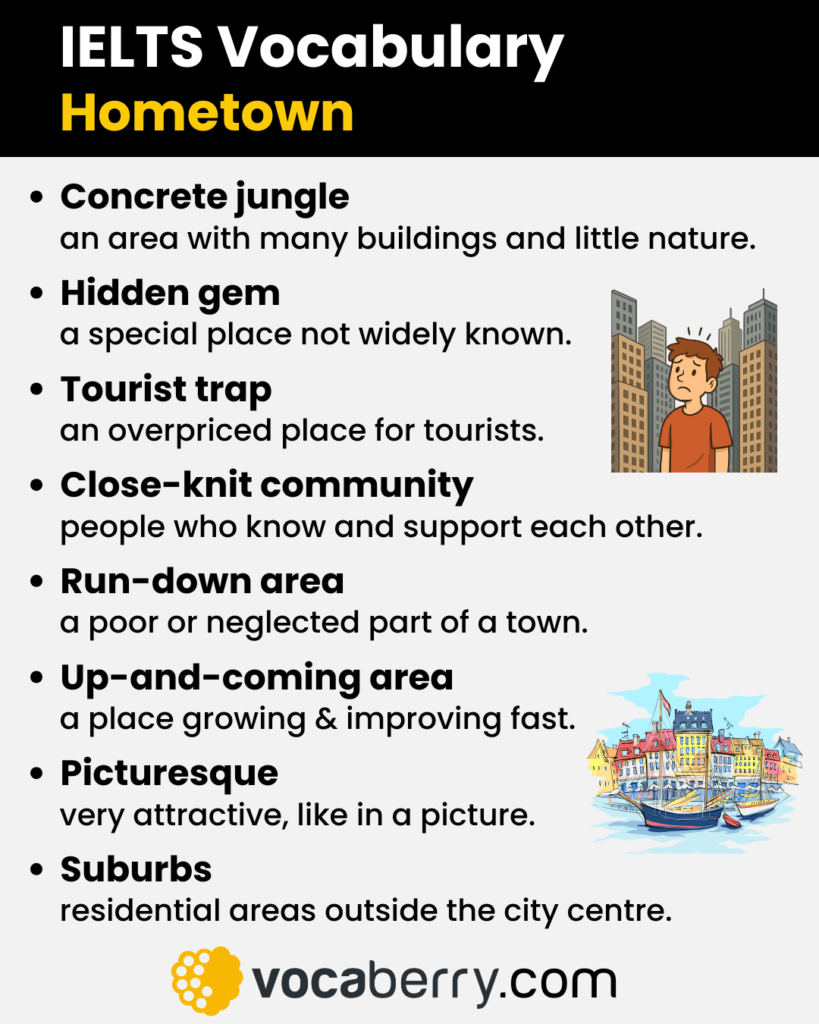
Talking about your hometown is one of the most common IELTS Speaking topics. Examiners may ask you to describe where you grew up, what has changed over time, or how it compares to other places. In this guide, you’ll find useful IELTS vocabulary for describing your hometown with clear definitions, followed by IELTS Speaking Part 1, Part 2, and Part 3 questions with sample answers. These examples will help you use the vocabulary naturally and prepare effectively for the IELTS Speaking test.
IELTS Vocabulary for Hometown
Here is some useful IELTS vocabulary for talking about your hometown with definitions. These words and phrases will help you give better answers in the IELTS Speaking test.
- Concrete jungle – a city area full of buildings with little nature.
- Bustling city – a city full of activity and noise.
- Tourist trap – a crowded place popular with tourists but often overpriced.
- Hidden gem – a beautiful or special place not many people know about.
- Cultural melting pot – a place where many cultures mix together.
- Laid-back atmosphere – a relaxed and easygoing feeling.
- Close-knit community – people in a town who know each other well.
- Residential area – part of a town where people live.
- Commercial district – area with lots of businesses and shops.
- Historic centre – the old part of a city with cultural landmarks.
- Modern metropolis – a large, modern, and busy city.
- Cosmopolitan city – a city with people from many cultures.
- Suburbs – residential areas outside the city centre.
- Countryside / rural area – land outside towns, with farms and villages.
- Outskirts – the outer edge of a town or city.
- Public transport system – buses, trains, and other shared transport.
- Green spaces – parks, gardens, or natural areas in a city.
- Tourist hotspot – a place that attracts lots of visitors.
- Tourist attraction – a popular place for visitors.
- Run-down area – part of a town in poor condition.
- Up-and-coming area – a place becoming more modern and developed.
- Overcrowded – having too many people.
- Affordable housing – homes with reasonable prices.
- Cost of living – how expensive it is to live in a place.
- Cultural heritage – traditions and buildings from the past.
- Lively nightlife – lots of bars, clubs, and evening entertainment.
- Well-connected – having good transport links.
- Well-preserved – an old area or building kept in very good condition.
- Well-maintained – clean and looked after properly.
- Picturesque – very attractive, like in a picture.
- Scenic landscape – beautiful natural surroundings.
- Pollution levels – how much air, water, or noise pollution there is.
- Job opportunities – chances to find employment.
- Economic migration – moving to another place for job opportunities.
- Local cuisine – traditional food from the area.
- Sense of community – friendly relationships among local people.
- Sprawling city – a large city spread over a wide area.
- Urban sprawl – the spread of cities into surrounding areas.
- Urban oasis – a peaceful green area in the middle of a busy city.
- Urban buzz – the lively, energetic feeling of city life.
- Pace of life – how fast or slow daily life feels in a place.
- Deprived area – a place with poverty and limited opportunities.
- Industrial area – part of a city with factories and warehouses.
- Cultural hub – a place known for art, music, or cultural events.
- Vibrant community – a lively and active neighbourhood or town.
- Gridlocked traffic – traffic that is completely stuck or barely moving.
- Quality of life – general well-being and comfort of living in a place.
- Infrastructure – basic systems like roads, transport, electricity, and water.
IELTS Speaking: Hometown Questions & Answers
In this section, you’ll find IELTS Speaking Part 1, Part 2, and Part 3 questions on the topic of hometown with sample answers. These examples show how the hometown vocabulary can be used naturally in the IELTS Speaking test.
IELTS Speaking Part 1 – Hometown
Where is your hometown?
My hometown is a modern metropolis located near the coast. It has a busy commercial district with shopping malls, but many families live in the suburbs / on the outskirts of the city.
What do you like about your hometown?
I love the fact that it’s a cultural melting pot. You can find all kinds of local cuisine and traditions. Also, the public transport system is really well-connected, so it’s easy to get around.
Is your hometown a good place for young people?
Yes, especially because of its vibrant community. There are lots of tourist attractions, sports centres, and job opportunities. The lively nightlife is also something that attracts young people.
Has your hometown changed much in recent years?
Yes, a lot. The city used to have many run-down areas, but they’ve been redeveloped. Now, it’s turning into a cosmopolitan city with more infrastructure and better quality of life.
What do you dislike about your hometown?
I think the main issue is pollution levels. With so many cars and factories in the industrial areas, the air quality isn’t great. Also, sometimes it feels like a bit of a concrete jungle.
IELTS Speaking Part 2 – Hometown Cue Card
Describe your hometown.
You should say:
- where it is
- what it is like
- what is special about it
- and explain how you feel about it
Sample Answer:
My hometown is a picturesque town about an hour from the capital city. It’s not a huge modern metropolis, but it has a nice balance between a residential area where most people live and a small commercial district with shops, cafés, and markets. The atmosphere is generally very laid-back, and life moves at a slower pace of life compared to bigger cities.
What makes it special is its strong sense of community. People know each other well, and it feels a bit like a close-knit community, where neighbours always greet each other and help out if needed. At the same time, it’s becoming more of an up-and-coming area, with new businesses and better infrastructure.
Another thing I really appreciate is the environment. The town has a lot of green spaces, like parks and gardens, and the surrounding countryside is only a short drive away. It’s not what you’d call a concrete jungle; instead, it has a mix of nature and small urban areas, which makes it very picturesque.
Of course, it’s not perfect. Public transport isn’t as well-connected as in bigger cities, so most people rely on cars, and there are limited job opportunities for young people. Still, I think the quality of life is good because housing is relatively affordable, and pollution levels are low.
Personally, I feel proud of my hometown because it has given me a strong sense of identity. Whenever I visit after being away, I realise that, despite its smaller size, it has its own charm and a very vibrant community that makes me feel at home.
IELTS Speaking Part 3 – Hometown Discussion
IELTS Speaking Part 3 questions about hometown often ask you to compare, give opinions, and discuss wider issues.
What are the advantages of living in a big city compared to a small town?
Big cities usually offer more job opportunities, better infrastructure, and a wider range of cultural activities. People also benefit from a well-connected public transport system and access to modern commercial districts with shopping malls and services. On the other hand, the cost of living is much higher, and many complain about pollution levels and the stressful pace of life.
Do you think the countryside is better than the city?
It depends on lifestyle. The countryside offers peace, fresh air, and beautiful scenic landscapes, which is ideal for families and people seeking a quieter life. However, cities provide more economic opportunities, better infrastructure, and a more vibrant community. Personally, I think each has its strengths: the countryside is great for quality of life, while cities are better for career growth.
How has your hometown changed over the years?
My hometown has developed a lot. What used to be a small residential area has grown into an up-and-coming town with new businesses, modern housing, and improved infrastructure. At the same time, we’ve lost some green spaces because of urban sprawl, and traffic has become worse, sometimes leading to gridlocked traffic. So while development brought convenience, it also created new challenges.
What can be done to improve life in cities?
Cities could focus on reducing pollution levels and creating more green spaces to balance out the concrete jungle. Affordable housing is also crucial, since the rising cost of living makes it hard for young people to settle. Improving public transport systems and controlling urban sprawl would also make cities more livable. In the long run, it’s about achieving a better balance between modern infrastructure and quality of life.
More IELTS Vocabulary Topics
If you found this lesson useful, explore other IELTS Speaking topics to expand your vocabulary and practice with sample answers:
- IELTS Vocabulary: Accommodation
- IELTS Vocabulary: Advertisement
- IELTS Vocabulary: Animals
- IELTS Vocabulary: Art
- IELTS Vocabulary: Artificial Intelligence
- IELTS Vocabulary: Books
- IELTS Vocabulary: Childhood
- IELTS Vocabulary: Crime and Punishment
- IELTS Vocabulary: Culture and Traditions
- IELTS Vocabulary: Daily Routine
- IELTS Vocabulary: Education
- IELTS Vocabulary: Environment
- IELTS Vocabulary: Family
- IELTS Vocabulary: Fashion and Clothes
- IELTS Vocabulary: Films
- IELTS Vocabulary: Food & Diet
- IELTS Vocabulary: Friends
- IELTS Vocabulary: Gifts
- IELTS Vocabulary: Health
- IELTS Vocabulary: Hobbies
- IELTS Vocabulary: Money
- IELTS Vocabulary: Museums
- IELTS Vocabulary: Music
- IELTS Vocabulary: Plants
- IELTS Vocabulary: Shopping
- IELTS Vocabulary: Social Media
- IELTS Vocabulary: Sports
- IELTS Vocabulary: Technology
- IELTS Vocabulary: Transport
- IELTS Vocabulary: Travel
- IELTS Vocabulary: Weather
- IELTS Vocabulary: Work & Jobs

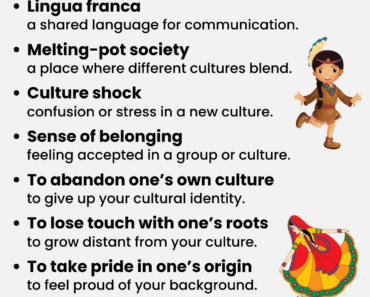
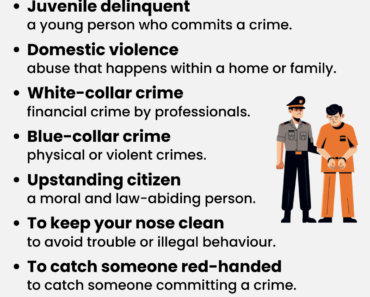
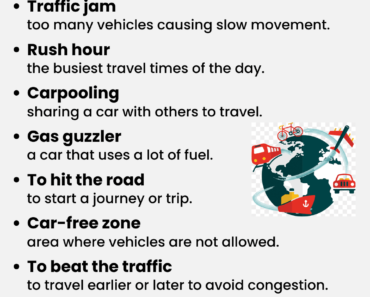
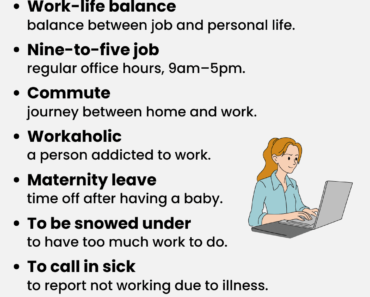


It’s very good for me to expand my understanding in English vocabulary…